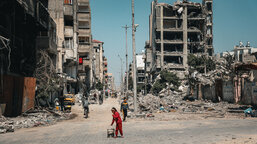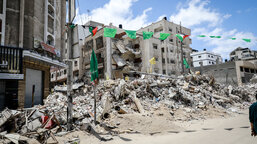The situation of Gaza’s residents has reached a critical point. For almost three months now, there has been a complete blockade of humanitarian aid deliveries by Israel. This is in stark violation of international humanitarian law and the rulings of the International Court. Hunger must not be used as a weapon of war. Before the debates on whether this constitutes genocide conclude, thousands more people, most of them children, will needlessly die in Gaza.
donate and help people in Gaza
The catastrophic situation in Gaza
Since the outbreak of the current war in October 2023, the people of Gaza have been facing one of the worst humanitarian crises in modern history. Continuous attacks and systematic destruction of infrastructure have flattened the vast majority of Gaza, turning it into a dead, uninhabitable zone. It is becoming a mass grave for its 2.1 million inhabitants. The enormous number of civilian casualties, repeated forced displacement, the collapse of the healthcare system, catastrophic shortages of basic necessities, and the acute threat of famine demand an immediate international response.
Since the start of the conflict, nearly 53,000 people have been killed in Gaza, and around 120,000 have been injured. The vast majority of the victims are women and children. Children account for half of all casualties. Furthermore, more than 1.9 million people have been forced from their homes, often repeatedly, seeking refuge in improvised conditions without access to basic necessities.
Collapse of healthcare
In addition to hunger, Gaza’s residents are facing a complete collapse of the healthcare system. Medical infrastructure has been devastated, with over 120 healthcare facilities targeted by direct attacks. More than 400 humanitarian workers and hundreds of medical staff have been killed. The hospitals that still operate are facing catastrophic shortages of basic medicines, medical supplies, and hygiene materials. They lack the capacity and means to provide essential care. Routine procedures such as childhood vaccinations, treatment for chronic illnesses, or surgeries for severe injuries have become virtually impossible.
Caritas is providing mainly healthcare and psychological support in Gaza, focusing particularly on minor injuries, chronic illnesses, and common acute illnesses. Caritas Jerusalem clinic, which had been rendered non-operational after the October 2023 attacks, has reopened. In addition, ten Caritas medical centres staffed by over 130 healthcare workers are operating across Gaza.
Israel’s blockade of humanitarian aid to Gaza
Since 2 March, Israeli authorities have entirely blocked all humanitarian aid deliveries to Gaza, including critically needed supplies such as drinking water, food, and medicines. The critical shortage of vital necessities, mass displacement, and the collapse of infrastructure are leading to the deaths of many innocent civilians. The entire population of Gaza is now facing a high level of acute food insecurity, with one million people experiencing extreme food shortages. More than half a million are directly threatened by famine. Children are particularly at risk; in northern Gaza, one in six children under two years old suffers from acute malnutrition. Tragically, children in Gaza have already begun dying from hunger and thirst.
Despite the fact that food supplies and humanitarian aid are ready at the borders, Israeli security checks and blockades prevent their entry into Gaza. While water, food, and other essential supplies pile up at the borders, their absence continues to claim more innocent lives.
Can Israel’s actions in Gaza be considered genocide?
According to the UN Convention, genocide is defined as intentional acts aimed at destroying a national, ethnic, racial, or religious group, including through killing, causing serious harm, or creating uninhabitable conditions. In January 2024, the International Court of Justice warned that there was a serious risk of genocide in Gaza and ordered Israel to take immediate measures to prevent it. The International Criminal Court has issued arrest warrants for Israeli officials for war crimes, including the starvation of civilians as a method of warfare. Although the world continues to debate whether Israel’s actions meet the definition of genocide, the harsh reality is that civilians continue to die daily due to Israel’s actions. Unless international institutions reach official conclusions soon, thousands or even tens of thousands more innocent lives could be lost in Gaza.
Newly proposed mechanism for aid distribution
In early May, Israel’s Security Cabinet approved a new mechanism for the distribution of humanitarian aid. This system transfers the responsibility for aid distribution to non-humanitarian actors and private security companies, jeopardising the neutrality, independence, and impartiality of humanitarian work. Humanitarian aid is thus being used as a tool of warfare, which is a violation of international humanitarian law. Humanitarian organisations warn that this approach restricts access to aid, exposes civilians and aid workers to further danger, and deepens the humanitarian crisis.
Caritas joins the international community in calling for an immediate and unconditional permanent ceasefire. It is crucial to restore unrestricted, safe, and swift access for humanitarian aid to all parts of Gaza, protect the civilian population, and respect the fundamental principles of international humanitarian law. Caritas also demands an end to the blockade that has prevented normal life in Gaza for the past sixteen years and adherence to the binding rulings of the International Court of Justice.
At this moment, when Gaza’s residents are facing famine, disease, and ongoing violence, the responsibility of the international community is undeniable. We must act together to prevent further unnecessary suffering and to protect human dignity and life itself.
Thank you for helping with us.
donate and help people in Gaza













